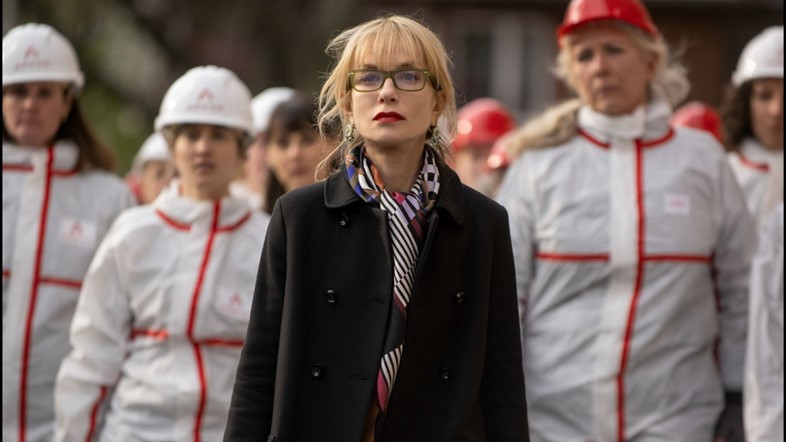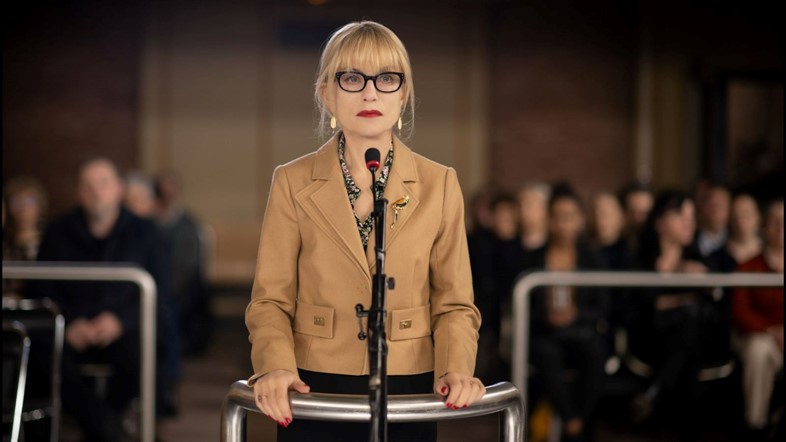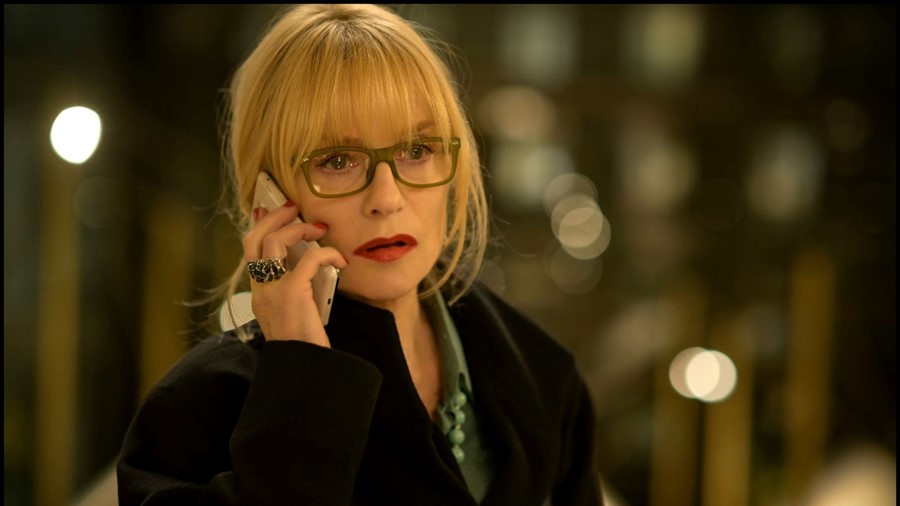As her new thriller La Syndicaliste hits cinemas, France’s favourite actress talks about why film is the perfect medium for putting people in uncomfortable situations
Seated at a table in a ninth-floor hotel room reserved for interviews, wearing simple jewellery and a T-shirt emblazoned with the word ‘LOVER’, is the slight yet monumental figure of Isabelle Huppert. A kaleidoscope of images and characters quickly rushes to mind: the doe-eyed murderer in Claude Chabrol’s Violette; austere music professor Erika Kohut in The Piano Teacher; a French actress named Isabelle in the profoundly unsettling Valley of Love; and the beating, bloodied heart of Paul Verhoeven’s wild revenge drama Elle, to pick out just a few.
Huppert’s latest role is that of Maureen Kearney in Jean-Paul Salomé’s new film La Syndicaliste: the tale of a real-life trade union leader and whistleblower at a French nuclear firm who was violently assaulted in her Paris home in 2012, then subjected to a years-long ordeal by investigators and a judiciary convinced she had somehow staged the episode. But though Kearney herself was appallingly disbelieved, Huppert’s ambiguous, enigmatic performance paradoxically makes her character – and her trauma – all the more believable, blowing away misconceptions about the so-called perfect victim with a gust of pure, cool air.
“She has a kind of poise, a constant poise that makes her very cerebral in a way, you know?” says Huppert. Kearney’s opacity was part of what attracted Huppert to the role, along with the vision of director Salomé (La Syndicaliste is the second of three collaborations between them). “I know his ability to go on a certain track and then to take you on a slightly different track. This [film] in particular can be taken as a political movie or a thriller, which it is. But in the meantime, it also just becomes the portrait of a woman – a very complex woman.”
Echoes of the basic plot of what is perhaps Huppert’s best-known film, 2016’s Elle, are unavoidable. In both features, a woman – one real, one fictional – is violated in her own home by a masked assailant. “I wouldn’t have thought about it, because in a way there was more irony in Elle’s character,” Huppert says – though there might, she reflects, be something about Kearney’s loneliness as she struggles for justice that could invite comparison. “What made Elle’s story really special is that it’s a revenge movie, but she does it all by herself. She doesn’t go to the police. She wants to, in a very tricky way, do it by herself. And not even by herself, actually, because even at the end, the way [her attacker] dies is more by chance,” she says with a laugh.

Kearney, in the film, has “almost what I would call a double face: the face of what she is at the beginning, and then a face that you can’t really read.” Borrowing from the real woman’s appearance and accoutrements – an unwaveringly neat, Hitchcock-style chignon, glasses that mediate the gaze, perfect red lipstick – contributed to a sense of impregnability.
Reading the script, Huppert says, “Immediately I knew exactly what I was going to do. I didn’t have to think about it because I’m very lazy.” There’s a short laugh around this last statement, more in the spirit of self-knowledge than self-deprecation; what Huppert means by lazy won’t align with most people’s definition of the word, especially with a filmography that runs to 152 credits and counting. But, as she elaborates on her understanding of what it is to act, “It’s so much about the present moment. There is nothing you can really anticipate, nothing that you can really project forward. It’s always like doing it for the first time – always, always no matter what. And that’s a very nice feeling, actually, because it doesn’t rely on experience.”

Arguably it’s this instinctive, present-moment process that has directors and actors clamouring to work with her, again and again. After appearing as one of his titular 8 Women back in 2002, Huppert will appear this year in François Ozon’s film The Crime is Mine as a “very nasty” and “very narcissistic” one-time silent film star. (In what could almost be a scene from Call My Agent! – in which Huppert has a brilliant season three cameo – she receives a message from Ozon as we speak. “I haven’t talked to him in a while!” she says. “It’s a nice coincidence.”)
Ultimately, what Huppert looks for in a script is a story that asks more questions than gives answers. “Cinema is the perfect medium to give the idea of a little ‘yes’ a little ‘no.’” More than any other form of art, she continues, it’s “the ideal medium for putting people in a kind of unstable, uncomfortable situation.” It’s exactly that little bit of yes and no – that oppositional, push-pull force – which makes Huppert herself such a magnetic force onscreen.
La Syndicaliste is out in UK cinemas now.
